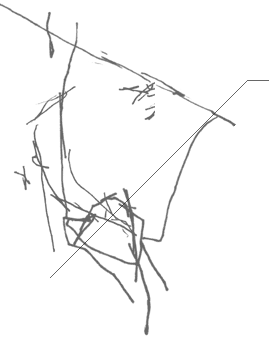Tuesday, March 3, 2026 |
||

|

by Michael Goldberg
Monday, June 10, 2002
When Noise Becomes Music
What makes the incomprehensible begin to make sense?
|
|||
|
"Your idea of good music is the sound of bottles breaking," my wife once
said to me. She was specifically referring to a track off The Modern Dance, the avant-garde rock combo Pere Ubu's wonderful 1978 recording,
which I gleefully enjoyed when the review copy arrived that year. The Modern Dance, including the sound of breaking glass, was indeed music to my
ears — then and now.
That was not always the case. In 1967, when I was 14, I saw a band whose music was even more "difficult" than that of Pere Ubu. The band was Captain Beefheart and His Magic Band; they performed at an outdoor concert on Mt. Tamalpais in Marin County. Ugh, I thought at the time. I couldn't stand the music they made that day. I couldn't relate to Beefheart's big, raw bluesman's voice, nor the cacophony of his band. I was still hooked on the sweet pop of The Beatles and the smoother rock sounds of The Doors, Hendrix and Cream. Yet today I number certain recordings by Captain Beefheart and His Magic Band — particularly Lick My Decals Off, Baby — as some of the greatest music I've ever heard. When I listen to "Doctor Dark" or "Woe-Is-uh-Me-Bob" or "The Buggy Boogie Woogie," I hear songs that go down easy. I don't have to "work" at listening to this music. I love it! Sometimes I crave it! At this point in my life, it is as "pop" as The Beatles' "Eight Days a Week" was when I was 13. What happened? How did music that once struck me as so harsh, incomprehensible and, well, unmusical, come to sound so good? How did noise become music? The music didn't change; it's still the same. I changed. Over time, my ideas about music changed. I opened up. If something didn't make sense the first time, I learned to give it the benefit of the doubt, to give it another try. Over the years, as I got older, I listened to a lot of different kinds of music: raw blues and soul and funk and hip-hop, reggae and dub and ska, traditional country, modern composers such as Philip Glass and Steve Reich and Terry Riley, jazz by the likes of Ornette Coleman and Mingus, Monk and Davis. Experimental music. Electronic music. And of course punk. Lots of punk. At first, a lot of this music was hard to listen to. I wasn't used to it. I didn't know the code. Some of the singers had weird voices, but they were weird in different ways than the non-traditional singers such as Bob Dylan that I already liked. Sometimes there was no melody to hang on to. Sometimes the lyrics didn't make sense, or didn't have anything to do with me and my life. And I listened to Beefheart albums over and over. With repetition, even the strangest music — if there's some soul to it, if it's "real" — starts to sound "normal." The oddest of sounds become "hooks." I remember the first time I heard "Anarchy in the U.K." I loved it, but it sounded so raw, so crude. Later, it sounded almost orchestral to me. And, in fact, compared to recordings by the '80s L.A. punks such as The Germs and Black Flag, it is orchestral. What we hear when listen to a recording really does change, depending on what we bring to our listening experience, what we've become accustomed to, our mood and, perhaps most important, our attitude. I know some folks who come to unfamiliar music with a "prove it" attitude. Not me. Each time I put a new CD into the player, my hope is that I will love it. I want to be surprised, shocked, challenged. I want to be moved in some way. I'm not saying I dig everything I hear. Of course not. There are good blues singers and lousy blues singers. Jazz that touches me and jazz I know is supposed to be good that I just can't relate to. Electronic music that speaks to me, and electronic music that sounds like, well, noise. Yet I'd have to say that there are artists I like in just about every musical genre I've spent time with. And it's only when you spend time exploring a musical genre that you begin to be able to differentiate between the really good stuff, and everything else. This evening, as I was working on this column, I put on The Modern Dance - you know, the album that incorporates the sound of breaking glass into one of the tracks. As it was playing, with the volume turned up, my wife came dancing into the room, holding our cat in her arms. For a few minutes she danced to the jagged 1978 rock of Pere Ubu. And once again I witnessed noise become music. |
||||